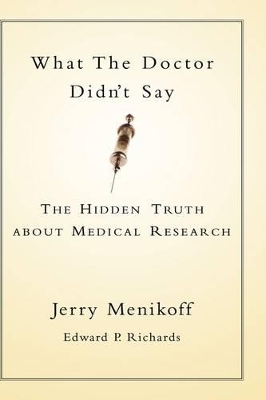
What the Doctor Didn't Say
Oxford University Press Inc (Verlag)
978-0-19-514797-1 (ISBN)
Most people know precious little about the risks and benefits of participating in a "clinical trial" - a medical research study involving some innovative treatment for a medical problem. Yet millions of people each year participate anyway. What the Doctor Didn't Say explains the reality: that our current system intentionally hides much of the information people need to make the right choice about whether to participate. Witness the following scenarios:
-Hundreds of patients with colon cancer undergo a new form of keyhole surgery at leading cancer centers - never being told that 85% of colorectal surgeons, worried that it increases the risk of the cancer returning, would not themselves undergo that procedure
-Tens of thousands of women at high risk of developing breast cancer are asked to participate in a major research study. They are told about the option of having both breasts surgically removed - but not told about the option of taking a standard osteoporosis pill that might cut the risk of getting breast cancer by one half or more
What the Doctor Didn't Say, written by two prominent experts in the field, is the first book to reveal the secrets that many in the research establishment have fought long and hard to keep from patients. It shows why options not commonly known - including getting a new treatment outside of a research study - can often be the best choice. It explains how patients can make good decisions even if there is only limited information about a treatment's effect. And it does this through the eye-opening of what is happening daily to thousands of people.
Day after day, we are learning how little we know about what really works. Headlines regularly announce that a previously unquestioned treatment - hormane replacement therapy, drugs such as Vioxx or Celebrex - may now be much riskier than we thought. The latest in a surge of recent books criticising the medical establishment (but the first to look at clinical trials specifically), What the Doctor Didn't Tell You helps to empower patients to survive in a world of medical uncertainty, and makes positive recommendations for systemic reform.
Jerry Menikoff is Associate Professor of Law, Ethics & Medicine at the University of Kansas School of Medicine, where he is also Director of the Institute for Bioethics, Law & Public Policy and chair of the Human Subjects Committee. He is also Associate Professor of Law at the University of Kansas School of Law. He is the author of a leading textbook on law and bioethics and co-author of a textbook on the ethics and regulation of research with human subjects. He has on a number of occasions served as a consultant to the federal government on issues relating to protecting research subjects. Edward P. Richards is Harvey A. Peltier Professor of Law at the Louisiana State University, where he directs the program in Law, Science, and Public Health. He has published several books and more than 100 articles on health and public health policy, and has consulted with state and federal agencies on public health and policy. He worked in medical research before becoming a law professor and has taught both FDA and biotechnology law.
PART I: HOW GOOD STUDIES CAN BE BAD CHOICES ; PART II: CONSENT: WHAT ARE SUBJECTS TOLD? ; PART III: WHEN CONSENT CAN'T BE OBTAINED ; PART IV: THE ROLE OF MONEY ; PART V: THE CHALLENGE FOR THE FUTURE
| Erscheint lt. Verlag | 7.9.2006 |
|---|---|
| Verlagsort | New York |
| Sprache | englisch |
| Maße | 162 x 235 mm |
| Gewicht | 603 g |
| Themenwelt | Medizin / Pharmazie ► Gesundheitswesen |
| Medizin / Pharmazie ► Medizinische Fachgebiete ► Medizinethik | |
| Studium ► Querschnittsbereiche ► Geschichte / Ethik der Medizin | |
| Studium ► Querschnittsbereiche ► Prävention / Gesundheitsförderung | |
| ISBN-10 | 0-19-514797-9 / 0195147979 |
| ISBN-13 | 978-0-19-514797-1 / 9780195147971 |
| Zustand | Neuware |
| Haben Sie eine Frage zum Produkt? |
aus dem Bereich


